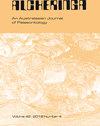产于中国新疆晚志留世的一种小型植物
IF 1.5
4区 地球科学
Q3 PALEONTOLOGY
引用次数: 2
摘要
摘要在新疆北部晚志留世(晚Pridoli)五图布拉克组中发现了一种新的小型植物:filformorama simplexa gen. et sp. nov.,并将其初步归入蛇足植物纲。这种植物有裸露的轴和二分分支系统。一个体,解释为孢子囊,形成二分法的一个分支的终止,而另一个子分支继续生长并进一步一分为二。大多数完整的孢子囊为圆形,但也有肾形或舌形,基部不对称。本文章由计算机程序翻译,如有差异,请以英文原文为准。
A diminutive plant from the Late Silurian of Xinjiang, China
A new diminutive plant, Filiformorama simplexa gen. et sp. nov., is described from the Late Silurian (late Pridoli) Wutubulake Formation of north Xinjiang, China and is placed tentatively in the rhyniophytoids. This plant has naked axes and a dichotomous branching system. A body, interpreted as a sporangium, forms the termination of one branch of a dichotomy, and the other daughter branch continues to grow and dichotomizes further. Most complete sporangia are circular, but some are reniform or tongue-shaped, with an asymmetric base.
求助全文
通过发布文献求助,成功后即可免费获取论文全文。
去求助
来源期刊

Alcheringa
地学-古生物学
CiteScore
2.60
自引率
7.70%
发文量
28
审稿时长
>12 weeks
期刊介绍:
Alcheringa : An Australasian Journal of Palaeontology is the official journal of the Australasian Palaeontologists.
Alcheringa covers all aspects of palaeontology and its ramifications into the earth and biological sciences, including:
Taxonomy-
Biostratigraphy-
Micropalaeontology-
Vertebrate palaeontology-
Palaeobotany-
Palynology-
Palaeobiology-
Palaeoanatomy-
Palaeoecology-
Biostratinomy-
Biogeography-
Chronobiology-
Biogeochemistry-
Palichnology.
Review articles are welcome, and may be solicited from time to time. Thematic issues are also possible. Emphasis is placed on high quality and informative illustration, in both line drawings and photographs. Papers of general significance may receive preference over those of more local interest.
 求助内容:
求助内容: 应助结果提醒方式:
应助结果提醒方式:


